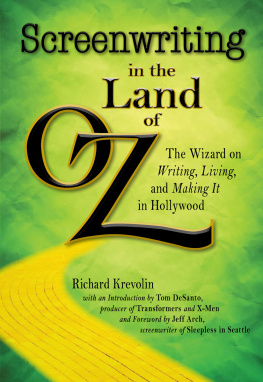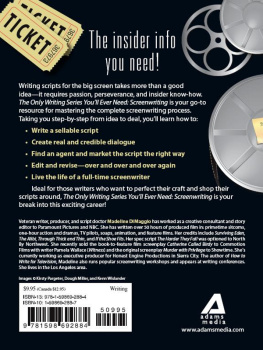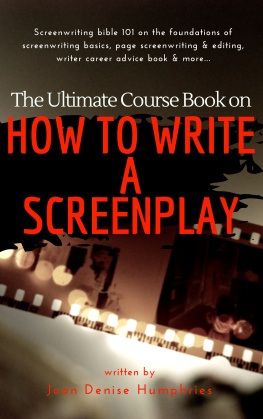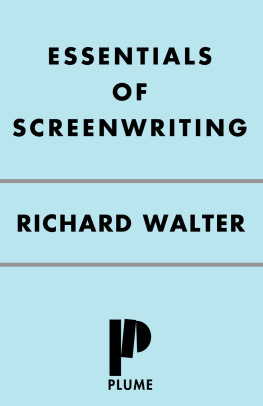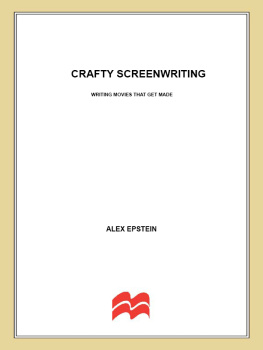To Laura Daly, whose line editing helped bring this book to life.
To Joseph Bologna, who has been my Socrates.
To John Drdek and J. Michael Legat for their scene-writing skills.
To Sherman and Evelyn Krevolin for all their love and support.
To all my teachers and to all those students and writers I've had the privilege to teach.
And of course, to Paula, my editor, who consistently helped me along the yellow brick road on my way to the Emerald City.
Foreword
W hen Rich Krevolin asked me to write the Foreword for his book, Screenwriting from the Soul, I was happy and flattered and pleased to have the opportunity not just to come through for Rich, but also because it gave me the chance to take a few things I had been thinking about, in the areas of writing and the writer's life in general, and see them published in a book that somebody else had already decided to publish and distribute, without any more effort required out of me.
I also saw it as a chance to have some fun, and I did have a lot of fun writing those pages. In fact, if I had the book in front of me right now, I'd be able to point out some of my favorite parts for you. However, as any experienced professional writer will tell you, when you're already in a very comfortable chair with your laptop strapped on, and you discover that the book you're referring to is not within direct arm's reach, which means you'd have to get up and do something about it if you actually want to refer to it, then maybe you're better off not referring to it after all, at least directly, because that could take you out of your chair which leads me to two key things about writing that I feel are very important to pass on at this point:
Have a loyal and comfortable chair.
Stay in it.
Now you might be thinking, there's a word for what this guy is talking about, and that word is lazy and all he's trying to do is justify his own laziness and call it dedication instead. To that I say, well maybe. I will freely admit that I'm not one of these guys you have to drag in from vigorous bouts of mountain climbing so that I can be forced to sit down and write. I would rather sit right here and climb my own mountains, so to speak, instead of the ones nature seems to always be putting outside somewhere, where you can pull your hamstrings off just breathing the air.
But also consider this while I could have been up looking for that book, I got a lot more done on this Foreword instead, which brings me that much closer to finishing it. Whereas if I had gotten up, anything could have happened.
Of course, lots of times good things happen when you get up. In fact, the whole thing is a pretty tricky subject, so I'm just going to forget about it and move on ahead, to a time a few years later when Rich went and wrote another book about screenwriting, and asked me to write a Foreword for that one too.
Readers of How to Adapt Anything into a Screenplay might remember that this second request involved a free lunch at a great noodle house in L.A., which I happily slurped up, while Rich generously paid the tab.
And maybe it was the noodles, but one thing I remember about that second Foreword was that it ended up taking a pretty strong position on Giant Monster Puppets, which should motivate you right now to go and get Rich's second book, so you can see what the hell I was talking about. I would tell you myself, but How to Adapt Anything is over on the same shelf as Screenwriting from the Soul and as we've discussed earlier, both of those books are currently across the room. I, however, by staying in this chair, am maybe halfway through this Foreword by now, which is a good thing because (a) I have a lot of other work to do and (b) so do you.
I should say here, though, since this latest book of Rich's is gathered around The Wizard of Oz, that even if it means getting vilified for this, personally I did not like that movie, not one single bit. First of all because on just about every possible level, it freaked the crap out of me just like it probably freaked the crap out of you, too, and everybody who ever saw it. But that doesn't mean I wanted to be freaked out, or that if I'd known ahead of time that I would be, I might have decided not to see it. I know it's supposed to be this big landmark thing and all, and it was I'm just saying that I don't think there's one solid frame in that whole event that wasn't viscerally unpleasant to me and didn't make me wish I was watching something else. Something that wasn't a fricking nightmare everywhere you looked. Even though I get it that these are the things that made it so incredible, and incredibly important the way it gets down into the absolute ground zero core psyche of your DNA and shakes it around like a golden retriever with a buttered rag doll in its mouth. In all its greatness, it was just way too disturbing, even if that's why it was so great. That movie made me so damn uncomfortable that I don't even want to talk about it anymore. I only brought it up because I figured I ought to.
Back to you then, and to Rich. If you're smart, you already have both of his earlier books, along with a deep bench of other good works the kind that inspire you and inform you and help you make your way through all the highs and lows and in-betweens that go hand in hand with being a screenwriter, or any writer at all. In fact, even writers who never intended to try screenplays (there might be two of you) would benefit from reading these books anyway because if nothing else, a good screenplay is all about storytelling and organized thinking and serious amounts of discipline. And every writer, no matter what he or she is writing, could stand to be better at those three things.

